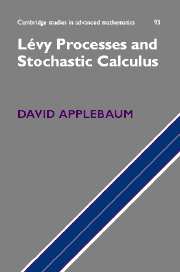Book contents
- Frontmatter
- Contents
- Preface
- Overview
- Notation
- 1 Lévy processes
- 2 Martingales, stopping times and random measures
- 3 Markov processes, semigroups and generators
- 4 Stochastic integration
- 5 Exponential martingales, change of measure and financial applications
- 6 Stochastic differential equations
- References
- Index of notation
- Subject index
5 - Exponential martingales, change of measure and financial applications
Published online by Cambridge University Press: 06 July 2010
- Frontmatter
- Contents
- Preface
- Overview
- Notation
- 1 Lévy processes
- 2 Martingales, stopping times and random measures
- 3 Markov processes, semigroups and generators
- 4 Stochastic integration
- 5 Exponential martingales, change of measure and financial applications
- 6 Stochastic differential equations
- References
- Index of notation
- Subject index
Summary
Summary We begin this chapter by studying two different types of ‘exponential’ of a Lévy-type stochastic integral Y. The first of these is the stochastic exponential, dZ(t) = Z(t −)dY(t), and the second is the process eY. We are particularly interested in identifying conditions under which eY is a martingale. It can then be used to implement a change to an equivalent measure. This leads to Girsanov's theorem, and an important special case of this is the Cameron–Martin–Maruyama theorem, which underlies analysis in Wiener space. In Section 5.3 we prove the martingale representation theorem in the Brownian case and also discuss extensions to include jump processes. The final section of this chapter briefly surveys some applications to option pricing. We discuss the search for equivalent risk-neutral measures within a general ‘geometric Lévy process’ stock price model. In the Brownian case, we derive the Black–Scholes pricing formula for a European option. In the general case, where the market is incomplete, we discuss the Föllmer–Schweitzer minimal measure and Esscher transform approaches. The case where the market is driven by a hyperbolic Lévy process is discussed in some detail.
In this chapter, we will explore further important properties of stochastic integrals, particularly the implications of Itô's formula. Many of the developments which we will study here, although of considerable theoretical interest in their own right, are also essential tools in mathematical finance as we will see in the final section of this chapter.
- Type
- Chapter
- Information
- Lévy Processes and Stochastic Calculus , pp. 246 - 291Publisher: Cambridge University PressPrint publication year: 2004

